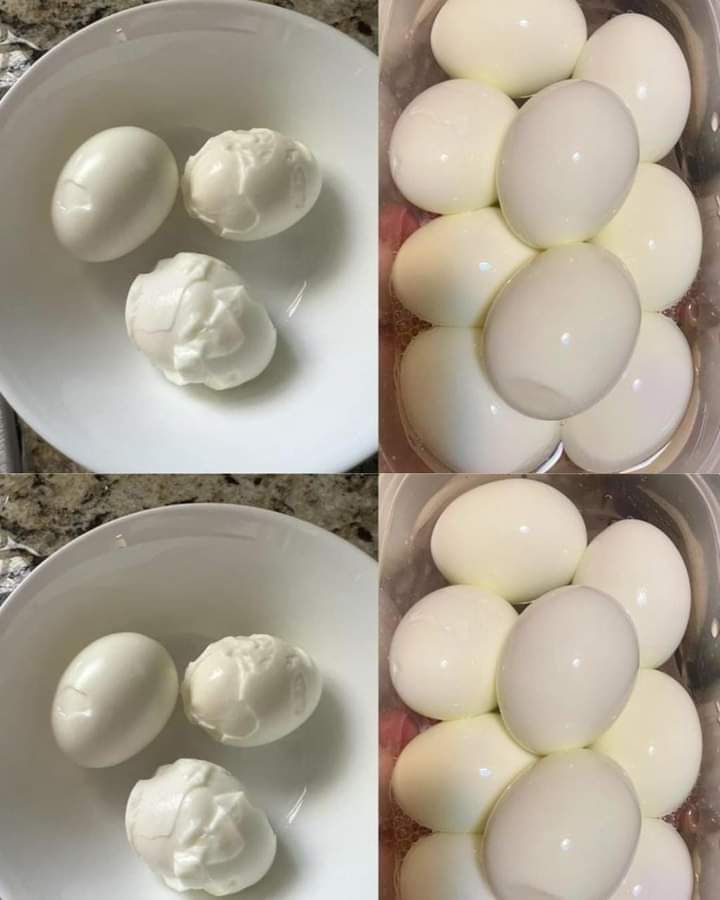ADVERTISEMENT
# The Simple Hack for Perfectly Peeled Hard-Boiled Eggs: A Game-Changer in the Kitchen
Hard-boiled eggs are a versatile, protein-packed food that can be enjoyed in a variety of ways. They make for an excellent snack, a perfect addition to salads, and a key ingredient in dishes like deviled eggs and egg salad. Despite their simplicity, hard-boiled eggs can be notoriously difficult to peel. Whether you’re trying to peel them for a quick snack or prepping them for a recipe, having an egg with stubborn, stuck-on shell bits can be frustrating.
However, a simple hack for peeling hard-boiled eggs exists, and once you learn it, you’ll never struggle with peeling eggs again. The beauty of this trick is that it’s easy to implement, works every time, and can save you a lot of time in the kitchen. In this article, we’ll dive into the science behind peeling hard-boiled eggs, why they can be so tricky to peel, and, most importantly, reveal the simple hack that literally everyone knows (and should) for perfectly peeled hard-boiled eggs.
## The Struggle of Peeling Hard-Boiled Eggs
Peeling hard-boiled eggs is one of those kitchen challenges that nearly every home cook has faced. You carefully boil your eggs, let them cool, and then when you go to peel them, you find bits of shell stubbornly clinging to the white of the egg. It’s frustrating to waste time and effort cleaning up the egg white while trying to avoid gouging the delicate egg with your fingers or a spoon.
So, why exactly do hard-boiled eggs sometimes peel so poorly? To answer that, we need to understand a bit about the structure of an egg and what happens during the boiling process.
### Why Is It So Hard to Peel Some Eggs?
The difficulty in peeling a hard-boiled egg is largely influenced by the egg’s freshness. Fresh eggs tend to be more difficult to peel because the membrane that lies between the shell and the egg white is still quite tight. Over time, as eggs age, the pH level in the egg increases, causing the proteins in the egg white to loosen from the membrane. As a result, older eggs tend to peel more easily.
However, this is not always a foolproof solution, and freshness alone doesn’t explain all peeling problems. The boiling time, temperature, and cooling process also play significant roles in how easily eggs peel after being boiled.
### The Science of Boiling Eggs
When you place eggs in boiling water, the proteins in the egg whites begin to denature and solidify. As the eggs cook, water from the outside of the egg moves into the egg white, causing the egg white to expand. The shell, on the other hand, is a bit more fragile, and as the temperature of the egg rises, it can cause the air pocket between the shell and the egg white to expand. If you don’t allow enough time for this process, or if the eggs cook too quickly or unevenly, the shell can stick more tightly to the egg white.
Other factors such as how quickly the eggs are cooled after boiling, the amount of salt or vinegar used in the water, and even the size of the eggs can influence the peeling process. But one thing is certain: the quest for a perfect, easy-to-peel hard-boiled egg has led to the discovery of a simple, foolproof hack that every home cook should know.
## The Simple Hack for Perfectly Peeled Hard-Boiled Eggs
The secret to easily peeling hard-boiled eggs lies in a straightforward technique that everyone can use. This method is so simple that it’s often overlooked, yet it works like a charm to ensure that your eggs peel smoothly every single time. So, what’s the hack? It’s the **ice water bath** method, or more specifically, the **shock and cool method**.
### How to Use the Ice Water Bath for Easy-to-Peel Eggs
Here’s the step-by-step process for boiling and peeling eggs with this simple hack:
### Ingredients and Supplies:
– Eggs (as many as you want to boil)
– Water
– Salt (optional)
– Ice (or very cold water)
### Instructions:
#### 1. **Prepare the Eggs**
Start by placing your eggs in a single layer in a saucepan or pot. Ensure that the pot is large enough to hold the eggs comfortably without overcrowding.
#### 2. **Add Water**
Fill the pot with enough cold water to cover the eggs by about an inch or so. If you like, you can add a pinch of salt to the water. While salt is often added to the water to help prevent cracking, its effect on peeling is minimal. However, some people believe it can help with making the eggs easier to peel.
#### 3. **Bring Water to a Boil**
Turn on the heat and bring the water to a boil over medium-high heat. Once the water is boiling, reduce the heat to a simmer and cook the eggs for about 9-12 minutes. The exact cooking time depends on how well done you want your eggs. If you prefer soft-boiled eggs, reduce the cooking time to 6-7 minutes.
4. **Prepare the Ice Water Bath**
While the eggs are boiling, prepare an ice water bath. Fill a large bowl with ice and water and set it aside. The goal here is to quickly cool the eggs after boiling, which will help separate the egg whites from the membrane, making them easier to peel.#
For Complete Cooking STEPS Please Head On Over To Next Page Or Open button (>) and don’t forget to SHARE with your Facebook friends
